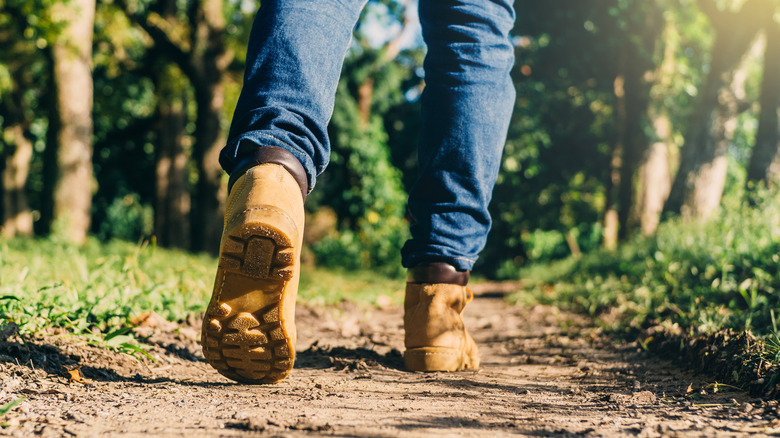The Real Difference Between Hiking And Walking
You've probably expressed at one time or another that it was "a real hike" to get somewhere, but — hyperbole aside — what's the real difference between hiking and walking?
According to VeryWell Fit, while there are no hard and fast rules about when your walk is technically a hike, habitual hikers have some general standards. The most fundamental is that a hike takes place in a natural setting like a forest, park, or desert. In contrast, walking is done in more urban settings with concrete surfaces and gravel paths, or can even be done indoors on a treadmill or in a large building like a mall. A hike may also require specialized gear that you likely would not need for walking, such as boots or hiking shoes that provide added traction and protect your feet from moisture and the elements. At times, hikers will also use hiking sticks or poles for additional balance and stability.
Is hiking healthier than walking?
When it comes to burning calories, hiking typically wins over walking. According to Healthline, the calories burned will depend on your body type, age, sex, the trail grade and the duration and speed of your hike. But because hiking is more likely to include sharper inclines and challenging terrain, you should choose it over walking if you are looking to burn calories more quickly and efficiently. For example, Healthline reveals that people weighing anywhere from 120 to 270 pounds will always burn more calories per hour on a moderate-paced hike at a low grade (5% or less) than on a brisk walk through the neighborhood.
WebMD reports that hiking provides numerous other health benefits as well. It can reduce your risk of heart disease, improve your blood pressure, promote bone density, strengthen your core, improve your balance, and provide a comprehensive workout for the muscles in your glutes, hips, and legs. Hiking can also give you a mental boost, as research has shown that being in nature can reduce feelings of stress and anxiety.
If you're a walker interested in crossing over into the hiking realm, just be sure not to bite off more than you can chew. To start, get the appropriate gear and find low-impact trails with moderate hills and terrain to make sure you get your hiking journey off on the right foot.


